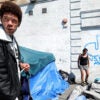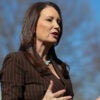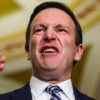It takes investment to get sustainable economic growth. We can’t spend our way to growth. We have to save some of the stuff we make today and use it to create new, higher value, tomorrow. If we produce and consume it all, then our economy lives “hand-to-mouth” and we do not grow.
Investing is risky. There is no guarantee that the investment will pay off. Investors weigh many possible scenarios when determining whether or not to make an investment. If the expected return on an investment does not meet an investor’s next best opportunity for his cash, he will forgo that investment.
The Daily Signal depends on the support of readers like you. Donate now
The expected rate of return compared is the after-tax rate of return. The higher the tax on returns, the more investments will be foregone. So why is Congress trying to discourage investment at a time when the economy desperately needs investment to start growing again?
Because in order to get a deficit neutral score from CBO the legislators needed to find more ways to squeeze revenue from taxpayers. Unfortunately increasing taxes from things that produce economic growth will cause the deficit to increase in a dynamic economy. Slower economic growth will result in fewer jobs and less tax revenue.
As revenues fall, the government must either cut spending or borrow more money. As the government borrows more, there is upward pressure on interest rates. Higher interest rates can crowd out private sector investments, which further slows growth..
The downward trajectory, the Senate and Reconciliation bill puts the economy on in the early years to pay for benefits in later years, are too steep to get out of. In just ten years, the Senate bill (without the large tax increases on investment), slow the economy enough to lose 690,000 jobs per year and add $755 billion to the debt. The Reconciliation bill then slaps the economy by increasing taxes on high-income individuals’ wages and on their growth producing investment income. A 2.9% tax on investment is estimated to cause interest payments on the debt to be $12.4 billion higher over just ten years and slows the economy further eroding household disposable income by an estimated $17.3 billion dollars per year. The Reconciliation bill is worse; it places an even higher 3.8% tax on investment income thereby increasing the after-tax rate of return threshold on those considering investing. When combined with the expiration of President Bush’s tax cuts, the tax rate on capital will be increased by over 50% for some taxpayers.
With slowing growth and rising deficits, it is no wonder that Standard and Poor’s is warning the U.S. about down-grading its debt. People who say “all you need is your health” perhaps do not realize how difficult it is to get quality health care in an unhealthy economy.
































